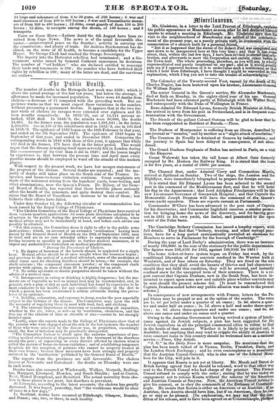t4t bralt4.
The number of deaths in the Metropolis last week was 1039 ; which is above the actual average of the last ten years, but below the average, if allowance be made for increased population. There were 45 deaths from cholera—a decrease of 21 compared with the preceding week. But ex- perience warns us that we must expect these variations in the number, without presuming a permanent decline. It appears that at the two for- mer visits of cholera its ravages were extended over eighteen and fif- teen months respectively. In 1832-'33, out of 14,144 persons at- tacked, 6729 died. In 1848-'9, the attacks were 30,000, the deaths 14,601. In the former year, the population was 1,681,641 ; in the latter, 2,206,076. One in 250 of the inhabitants died in 1832-'3, one in 151 died in 1818-'9. The epidemic of 1832 began on the 16th February in that year, and ended on the 7th September 1833. The epidemic of 1848 began in September of that year, and ended in December 1849. Comparing the corresponding weeks in 1848 with those of this year, it appears that while 162 died in the former, 278 have died in the latter period. This would argue that the disease is making itself more severely felt in London during this commencement of its visit than it did in 1849 ; and the lesson taught
• by experience is, that between the present time and April next every possible means should be employed to ward off the attacks of this modern plague.
With respect to the present week, we have but meagre statements of the progress of the disease. Several deaths are reported ; and the ma- jority of deaths still takes place on the South side of the Thames. In- spection and house-to-house visitation continue. Great complaints are made of the nuisances arising from the knackers' yards, bone-boiling, and other abominations, near the Queen's I'rison. Dr. Milroy, of the Gene- ral Board of Health, has reported that these horrible places seriously affect the health of the prisoners, and quite destroy their comfort. He states that the Board of Guardians are desirous to be rid of them ; but hitherto their efforts have failed.
-Under date October 15, the following circular of recommendation has been issued by the Royal College of Physicians.
"The Cholera Committee of the Royal College of Physicians have received
from various quarters applications for some plain directions calculated to be of service to *he public during the prevalence of epidemic cholera, when medical advice may not be immediately at hand, and before such advice can possibly be obtained.
"For this reason, the Committee deem it right to offer to the public some instructions; which, on account of an extended 'notification' having been issued by the General Board of Health on the 20th of September 1853, may be brief, and are in no case intended either to supersede the necessity of having recourse as speedily as possible to further medical assistance, or to impose any authoritative restriction on medical practitioners. "During the Tn-valence of Cholera. "1. No degree of looseness of the bowels should be neglected for a single
hour. Medical advice should be at once sought when the looseness begins ; and previous to the arrival of a medical attendant, some of the medicines at other times used for checking diarrhma should be taken,—for example the chalk mixture ; the compound cinnamon powder ; or the compound Chalk powder with opium, in doses of from 20 to 40 grains for an adult.
"2. No saline aperients or drastic purgatives should be taken without the advice of a medical man.
"3. Intemperance in eating or drinking is highly dangerous; but the mo- derate use of vegetable as well as animal food may be recommended, and, in general, such a plan of diet as each individual has found by experience to be most conducive to his health ; for any considerable change in the diet to which a person has been accustomed is seldom advisable during the preva- lence of an epidemic.
" 4. Debility, exhaustion, and exposure to damp, render the poor especially subject to the violence of the disease. The Committee urge upon the rich the necessity of supplying those in need with food, fuel, and clothing. "5. The extreme importance of removing or counteracting all impurities, whether in the air, water, or soil—as by ventilation, cleanliness, and the free use of the chloride of lime or chloride of zinc—cannot be too strongly insisted upon. "Lastly, since the reports made to the College of Physicians show that of the persons who were engaged about the sick in the last epidemic the number of those who were attacked by the disease was, in proportion, exceedingly small, the fear of infection may be practically disregarded.
"The Committee forbear to dwell upon the extreme importance of pro- I
vidiug medical attendants at dispensaries for the treatment of the diarrhma among the poor ; of organizing in every district affected by cholera what is called the system of house-to-house visitation ; and of establishing temporary hospitals for the reception of patients who cannot be properly treated at their own homes ; because these measures have been strongly and properly enforced in the notification' published by the General Board of Health."
The reports from the provinces are still favourable. The cholera lingers at Newcastle and Gateshead : the deaths on Thursday were one in each town.
Deaths have also occurred at Warkwortb, Walker, Morpeth, Bedling- ton, Maryport, Liverpool, Howden, and South Shields; and at Custon,
• Kent, Hemel Hempstead, and Brantford. The actual mortality from cho- lera in these places is not great, but diarrhcea is prevalent.
At Liverpool, according to the latest accounts, the cholera has greatly decreased. It was hoped, yesterday, that "the workhouse would be clear of cases in a few days." In Scotland, deaths have occurred at Edinburgh, Glasgow, Dundee, and Dunse; one, two, or three, in each locality.


























 Previous page
Previous page